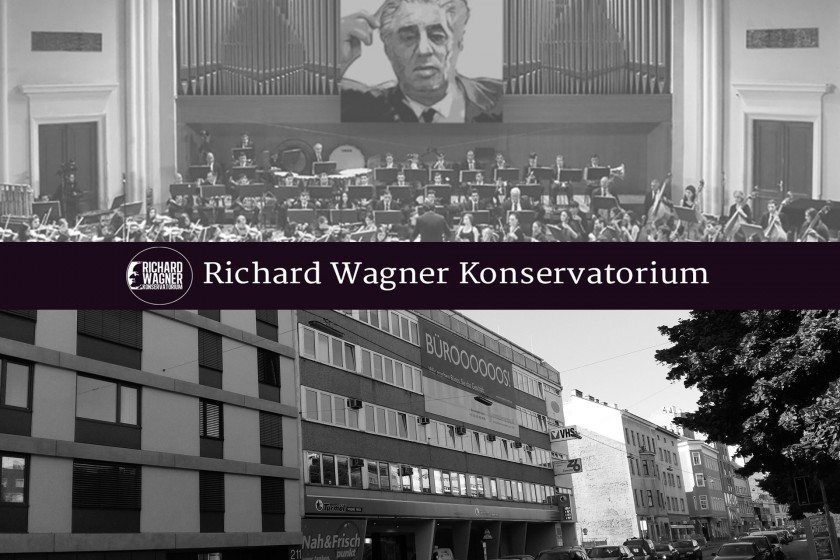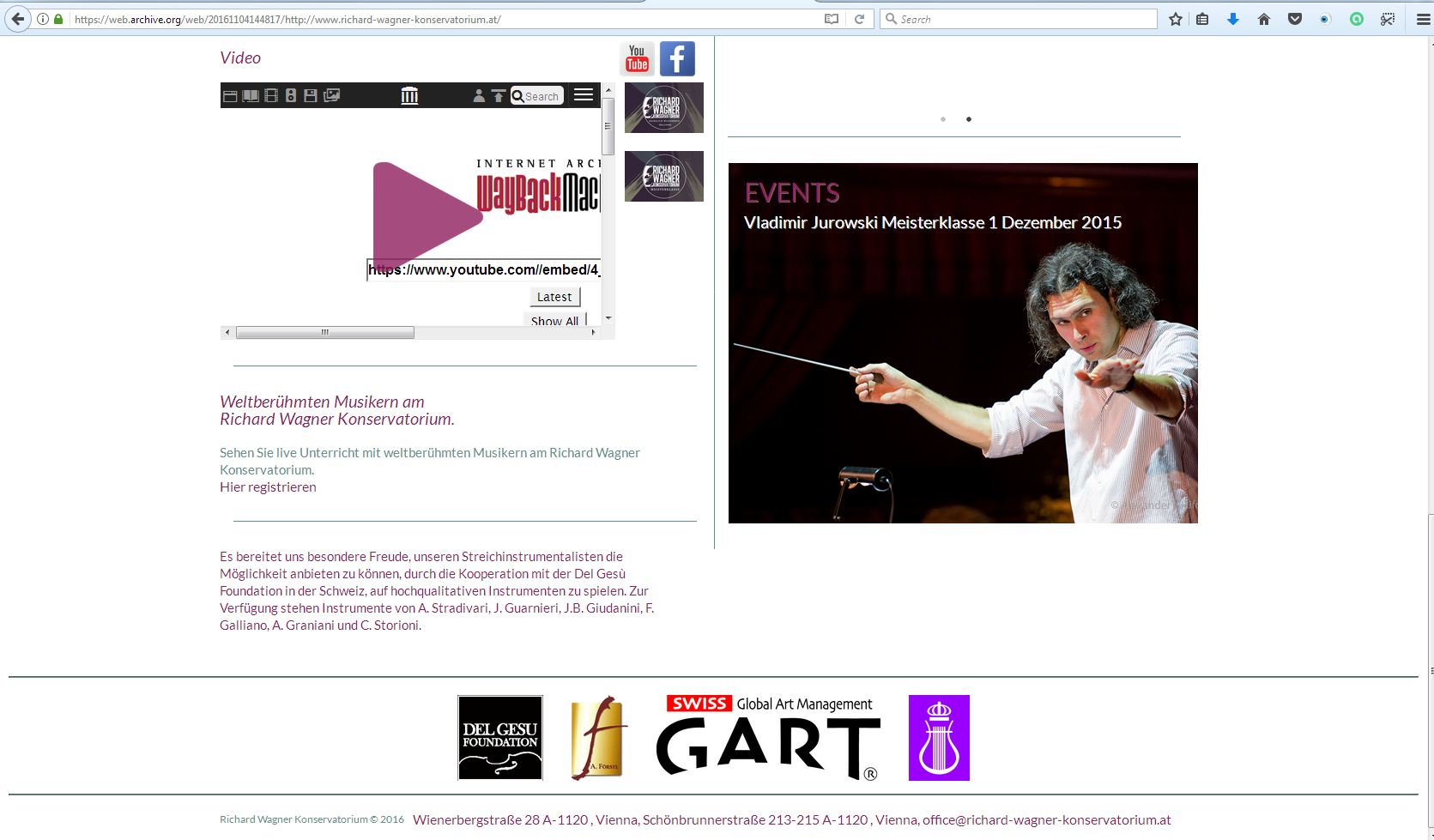
Sham Education? Yerevan Conservatory Grants Diplomas to Students in Vienna
Edik Baghdasaryan
Levon Hayrapetyan
DOSSIER
As the official partner of Vienna’s Richard Wagner Conservatory, the Aram Khachaturian Competition-Cultural Foundation illegally controls the diplomas of Yerevan State Conservatory, handing them out to students who never attended its classes.
In June 2015, the Aram Khachaturian Competition-Cultural Foundation (AKCCF), as an official partner of the Richard Wagner Conservatory (RWK), sent booklets promoting the Richard Wagner Conservatory to all the participants in the 11th Aram Khachaturian Violinists’ Competition.
The letter said that: "AKHIC participant willing to apply to Wagner Konservatorium is granted the chance to pass a required audition in Yerevan’’. (Nota Bene - without applying in advance). [AKHIC - Aram Khachaturian International Competition]
According to the sent brochure, one can receive an artist’s diploma at the Vienna Richard Wagner Conservatory, where the annual tuition is EUR 4,900. The conservatory doesn’t have the right to grant academic titles.
However, in addition to artist diplomas, students can receive Bachelor and Masters degrees, due to the collaboration with the Yerevan State Conservatory (YSC). Students receive these diplomas without attending classes at the Yerevan Conservatory, and are only obligated to travel to Yerevan to give a final exam, by paying an additional EUR 3,600. In essence, students receive diplomas without ever attending academic classes, if we take into account that the Wagner Conservatory, by law, cannot, and does not, organize such classes. From Vienna, one can also be granted the title of “aspirant” (research fellow, enrolled in a Ph.D. degree); in this case from the State Art Academy of Armenia, by paying EUR 3,600 annually.
While the AKCCF and the RWK were advertising the possibility of studying in Vienna and receiving a degree from YSC, both the YSC and Armenia’s Ministry of Education and Science were denying any claim of cooperation between the YSC and the RWC.
‘Even though a cooperation agreement between the two had been signed on September 27, 2014, the YSC and Wagner, it was never implemented, and thus, there were no Armenian or foreign students studying simultaneously at both conservatories’, they responded to Hetq’s inquiries.
However, in his first interview to our Austrian colleagues, RWK Director Mirza Kapetanovich boasted that a few of his students would receive joint diplomas in June 2017 - three in Armenia and six in Bosnia. He quickly denied it all after we presented him with the reply received from Armenia’s Ministry of Education and Science.
Even though we’ve saved the recording of the interview, the promotional brochure sent by the AKCCF, and the information that appeared in the RWK website, Kapetanovich is trying to deny any cooperation, claiming that the RWK isn’t a university and thus, cannot issue academic degrees.
We should note that according to Austrian law, a conservatory in Austria, as opposed to a university, can issue artist diplomas, but not academic degrees. However, given that many students value a B.A. or Master’s degree more, the RWK decided to “collaborate” with overseas universities. The two chosen were the YSC in Armenia (full name Komitas State Conservatory of Yerevan) and the Slobomir P University near the city of Bijeljina, in the Republika Srpska part of Bosnia and Herzegovina. The choice probably stemmed from the fact that only very few universities would agree to have their degrees handed out to students from places like the RWK, with its low education standards; students who have never attended academic classes.
Thus, the RWK entered into collaboration with the Smbatyan family and Slobodan Pavlovich, the founder of Slobomir P University.
In addition to acquiring the AOKS building and Tchaikovsky Music School lands in Yerevan, entering into a suspect collaboration with the Del Gesu Foundation and SwissGart, and infractions at the Aram Khachaturian International Competition, Armen Smbatyan has been charged with diverting Armenia Ministry of Culture funds to his family members. His son Sergey is regarded as a main beneficiary.
In 2016 alone, the young conductor’s Support Classical Music NGO received US$212,000 from Armenia’s Ministry of Culture. The State Youth Orchestra he founded immediately received official status, overlooking his apparent professional shortcomings and the low performance level of the orchestra. Experts and audiences alike have commented on both.
Armen Smbatyan served as Armenia’s ambassador to Russia from 2002 to 2010. The press periodically mentions his name in connection to various scandals.
The RWK’s other partner, Slobodan Pavlovich, is implicated in a 2015 money laundering scheme. He and three other suspects, including current Republika Srpska President Milorad Dodik, were arrested in February 2015. Among other things, they are suspected of abuse of office and money laundering in connection with Pavlovic Bank.
The other two partners of RWK are the non-existent Del Gesu Foundation and Ino Mirkovic’s infamous SwissGart agency, which we’ve described in detail above. Even though the RWK removed logos of these two organizations while we were conducting our investigation, evidence is preserved in the internet archives and is saved by us.

Partners of the Richard Wagner Conservatory. Photo in the conservatory website.
The “handwriting” of the RWK adverts, based on fabricated and incorrect information, is well-known to us from the activities of the Smbatyan family.
The RWK, touting itself as “one of the world’s leading music schools”, says it offers the chance “to work, under one roof, with the most prominent musicians”, and the “the highest quality of teaching”. The RWK goes on to say that, as a result, its students “win major competitions” and are “among the top soloists of our times.”
Contrary to its florid self-promotion, the RWK only occupies a few rooms on the second floor of a building near the Längenfeldgasse metro station in Vienna’s rundown 12th District. A discount service center is on the first floor. Some of the professors listed in the RWK website don’t teach at the conservatory. Some have only conducted a one-day master class during the past four years, while others have denied teaching at RWK.

Some of the forty instructors listed on the website aren’t even aware that they “work” at the RWK. Stanislav Tikhonov, for example, was surprised to learn that he is listed as a faculty member. While he did agree to take on one student a few years ago, the lessons never took place “due to personal and organizational reasons”. Tikhonov’s name disappeared from the website soon after we sent him some questions in writing. Roman Patkolo also denies any links to the conservatory’s teaching staff. “There must be some misunderstanding,” he wrote. “I don’t teach, nor do I conduct master classes.”
The admission requirements for RWK are quite low. While most international schools usually cite the number of applicants and those admitted, including foreign students (for example, Vienna’s University of Music and Performing Arts-MDW, accepts 100 out of every 600 applicants), the RWK keeps and publishes no such numbers. The Vienna Municipal Education Authority did not provide Dossier with this data. Dossier sued the Authority, arguing a freedom of information violation. Even Vienna’s municipal department responsible for immigration and citizenship, overseeing immigration and citizenship issues, has no data regarding how many overseas students have applied for residency and for what schools.
Students say that academic knowledge isn’t necessary to get accepted at RWK. The 2013 case of a student (who wishes to remain anonymous) proves just how easy it is to get accepted. The student was accepted to pursue studies in solo singing without any prior singing lessons. Other interview with students at RWK described the entrance examination as “very easy”. In addition to mastering their own instruments at basic level, the RWK demands that applicants have a basic understanding of musical notation, but not a deep grasp of music theory. Students say the RWK doesn’t require any certification of German language proficiency, or any other diploma. Applicants to Vienna’s University of Music and Performing Arts, on the other hand, must pass a multi-step admissions procedure that tests their acoustical and music theory knowledge, must give a qualifying performance on their main instrument, an audition on the piano, and must provide certification of B1 proficiency level in German.
Kapetanovich is proud of the fact that anyone can take the admittance examination, believing it’s tied to human rights. As an example, he cites the case of an Iranian student and a letter he received from the Iranian consulate on the matter. The student needed an Austrian visa to take the RWK admittance exam. But the consulate had responded, writing, “…that it couldn’t imagine why an air conditioning technician would want to study classical music.”
Around 80% of RWK students are international, and some apply for Austrian residency to benefit from the advantages of living in Vienna. An artistic diploma from any Austrian institution is often sufficient to find work in the Asian or Iranian marketplace, whereas academic degrees from the YSC or Bosnia more than justify the high tuition fees. (In comparison, even rates for non-EU students at Vienna’s University of Music and Performing Arts are around EUR 1,500 per academic year).
To sum up, RWK students, with their low level of professional knowledge, and without having to attend academic courses, easily obtain Vienna residency papers. Austrian reporters are concerned by their government’s poor oversight, shortcomings in the law, and freedom of information violations. The government fails to monitor who calls itself a “conservatory” or a “music academy, the credentials of such institutions, and the quality of the education they offer. As a result, these institutions can issue fake diplomas and offer so-called master classes in shady collaboration with offshore companies and shell companies.
Responding to Hetq inquiries, Armen Smbatyan repeated the Aram Khachaturian Competition Foundation director’s statement that it collaborated with the Del Gesu Foundation just the one time, in 2015, and that consequently, it had no information as to its activities or location.
Regarding collaboration with the Richard Wagner Conservatory, Smbatyan responded, “The Richard Wagner Conservatory has never been, and has never been regarded, as an official partner of the Aram Khachaturian International Competition.” Furthermore, he was hearing about Mirza Kapetanovich for the first time.
Meanwhile, the Smbatyan family’s cultural empire prospers, and a large part of Armenia’s educational/cultural budget continues to wind up in their pockets.
In the meantime, presidential advisor Armen Smbatyan continues to advise Armenian President Serzh Sargsyan on cultural issues.
 |
 |
Top photo: Building housing Vienna’s Richard Wagner Conservatory
Research was supported by Robert Bosch Foundation
 |
 |
 Videos
Videos Photos
Photos
Comments (4)
Write a comment